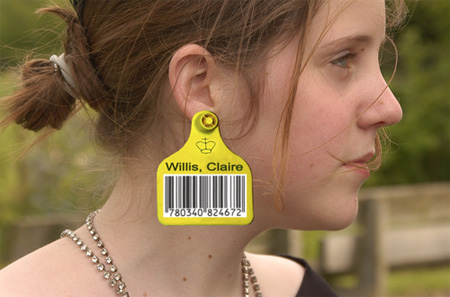

See the difference now?
Posted on 07/18/2007 10:49:01 AM PDT by TheTruthAintPretty
The American Medical Association (AMA) has officially established a code of ethics designed to protect patients receiving RFID implants. The recommendations focus on safeguarding a patient's privacy and health, and are the result of an evaluation by the AMA's Council on Ethical and Judicial Affairs (CEJA) regarding the medical and ethical implications of RFID chips in humans, as well as a follow-up report recently released. The latter discusses the possible advantages and specific privacy and ethical issues of using RFID-enabled implantations for clinical purposes.
Entitled "Radio Frequency ID Devices in Humans," the report is presented by Robert M. Sade, M.D., who chairs the CEJA. It acknowledges that RFID's use in health care "represents another promising development in information technology, but also raises important ethical, legal and social issues." The report adds, "Specifically, the use of RFID labeling in humans for medical purposes may improve patient safety, but also may pose some physical risks, compromise patient privacy, or present other social hazards."
The AMA's report identifies three specific recommendations: The informed-consent process must include disclosure of medical uncertainties associated with these devices; physicians should strive to protect patients' privacy by storing confidential information only on RFID devices utilizing informational security similar to that required for medical records; and physicians should support research into the safety and efficacy of RFID devices implanted in human beings, and examine the role of doctors regarding the nonmedical uses of the technology.
The recommendations now serve as ethical guidelines for physicians and caregivers, explains Steven Stack, M.D., a member of the AMA's board of trustees, and are officially part of the AMA's medical ethics code. While not law, the AMA's code of ethics has long served as a standard of conduct defining the essentials of honorable physician behavior.
"The AMA is the largest professional organization representing the interest of physicians and patients in the U.S.," Stack says, "and the AMA's code of ethics is the most widely accepted guidance for physicians' professional, ethical practices." In fact, he adds, courts and governments often use the AMA's ethics codes as guidelines.
Central to the AMA's recommendations is that RFID implantable devices still need to be researched. The report indicates such implants may present physical risks to patients, because the devices can migrate under the skin and become difficult to extract. It goes on to say the risks may be minimized "by constructing RFID tags from materials that permit surrounding tissue to encase the device." Furthermore, the document cautions that RFID tags may electromagnetically interfere with electrosurgical devices (medical tools that use electrical currents for cauterization during surgery) and defibrillators, and that more research needs to be done regarding whether RFID tags might also affect the efficacy of pharmaceuticals.
From a privacy perspective, the AMA notes, RFID device security has not been fully established, so physicians "cannot assure patients that the personal information contained on RFID tags will be appropriately protected." Beyond just storing unique ID numbers on the tags, the association suggests the medical community also consider computer encryption and digital signatures to protect the data.
Moreover, the report recommends that RFID tags not be implanted or removed without the prior consent of patients, as per the AMA's policies regarding informed consent. More specifically, patients—or those acting as the legal guardians of patients—should be informed of the potential risks and benefits associated with RFID tags, as well as who will be granted access to the data contained on those tags, and the purposes for which this information will be used.
Shortly after the AMA released its report, VeriChip Corp., a maker of implantable RFID tags, applauded the association'srecommendations, saying they could help improve the acceptance of RFID implantable devices in the health-care industry. VeriChip manufactures the VeriMed system, which features a glass-encased passive RFID tag that can be injected into a patient's arm.
A hospital or medical staffer carrying a handheld interrogator can read a VeriChip's unique 16-digit identifying number, then link that patient's identity to such medical-record details as allergies, medications taken and blood type. The VeriMed system is the only human-implantable radio frequency transponder system cleared by the U.S. Food and Drug Administration (FDA) for the purpose of patient identification and health information.
VeriChip could not be reached by press time to comment on some of the AMA's concerns regarding RF interference, privacy and security. In the past, however, the company has claimed that when its glass-encased tag is inserted just under the skin, a small amount of scar tissue forms around it, preventing the chip from moving or migrating. In addition, VeriChip has stated that any patient data associated with the 16-digit number is stored in a secure online database, accessible only by authorized health-care workers.
bttt
RFID being surgically installed into human beings is NOT ethical today, tomorrow, or ever.
No different than medical alert bracelets or ankle monitoring systems when you think about it....
bttt
Mark of the beast ... I refuse to ever do and neither will any of my children.
What about Alzheimer’s patients and others who are mentally impaired and may wander off and not know how to get back?
If you have nothing to hide, what's your worry? (/sarcasm)


See the difference now?
For the mentally impaired, bracelets or anklets. Nothing goes under the skin ever.
Would a toddler be left unattended? If adequately supervised, this shouldn’t happen. The problem is neglect, not the patient.
I suggest we chip their corporate officers and spokespeople so we can get hold of them when we need to.
bump
ping
http://www.freerepublic.com/focus/f-news/1753165/posts
A GENERATION IS ALL THEY NEED
ROFL

That’s a keeper.
Disclaimer: Opinions posted on Free Republic are those of the individual posters and do not necessarily represent the opinion of Free Republic or its management. All materials posted herein are protected by copyright law and the exemption for fair use of copyrighted works.